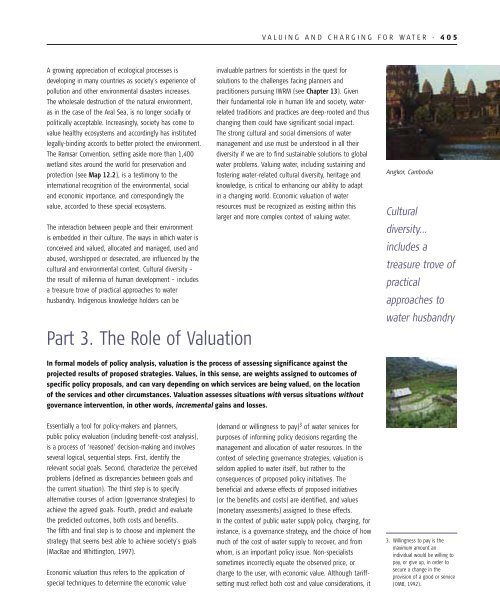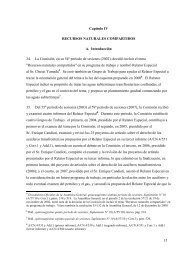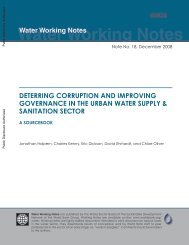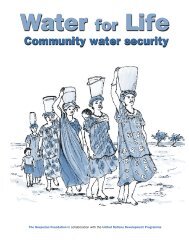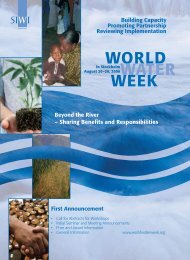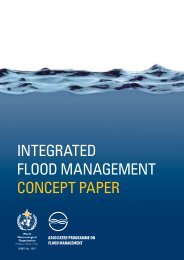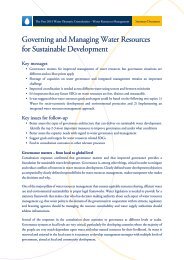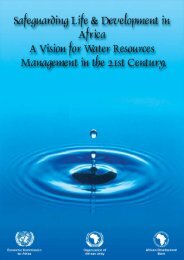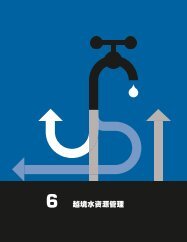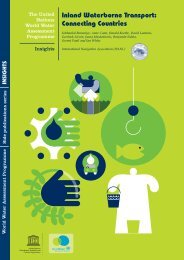Water: a shared responsibility; 2006 - UN-Water
Water: a shared responsibility; 2006 - UN-Water
Water: a shared responsibility; 2006 - UN-Water
Create successful ePaper yourself
Turn your PDF publications into a flip-book with our unique Google optimized e-Paper software.
V A L U I N G A N D C H A R G I N G F O R W A T E R . 405<br />
A growing appreciation of ecological processes is<br />
developing in many countries as society’s experience of<br />
pollution and other environmental disasters increases.<br />
The wholesale destruction of the natural environment,<br />
as in the case of the Aral Sea, is no longer socially or<br />
politically acceptable. Increasingly, society has come to<br />
value healthy ecosystems and accordingly has instituted<br />
legally-binding accords to better protect the environment.<br />
The Ramsar Convention, setting aside more than 1,400<br />
wetland sites around the world for preservation and<br />
protection (see Map 12.2), is a testimony to the<br />
international recognition of the environmental, social<br />
and economic importance, and correspondingly the<br />
value, accorded to these special ecosystems.<br />
The interaction between people and their environment<br />
is embedded in their culture. The ways in which water is<br />
conceived and valued, allocated and managed, used and<br />
abused, worshipped or desecrated, are influenced by the<br />
cultural and environmental context. Cultural diversity –<br />
the result of millennia of human development – includes<br />
a treasure trove of practical approaches to water<br />
husbandry. Indigenous knowledge holders can be<br />
Part 3. The Role of Valuation<br />
invaluable partners for scientists in the quest for<br />
solutions to the challenges facing planners and<br />
practitioners pursuing IWRM (see Chapter 13). Given<br />
their fundamental role in human life and society, waterrelated<br />
traditions and practices are deep-rooted and thus<br />
changing them could have significant social impact.<br />
The strong cultural and social dimensions of water<br />
management and use must be understood in all their<br />
diversity if we are to find sustainable solutions to global<br />
water problems. Valuing water, including sustaining and<br />
fostering water-related cultural diversity, heritage and<br />
knowledge, is critical to enhancing our ability to adapt<br />
in a changing world. Economic valuation of water<br />
resources must be recognized as existing within this<br />
larger and more complex context of valuing water.<br />
Angkor, Cambodia<br />
Cultural<br />
diversity…<br />
includes a<br />
treasure trove of<br />
practical<br />
approaches to<br />
water husbandry<br />
In formal models of policy analysis, valuation is the process of assessing significance against the<br />
projected results of proposed strategies. Values, in this sense, are weights assigned to outcomes of<br />
specific policy proposals, and can vary depending on which services are being valued, on the location<br />
of the services and other circumstances. Valuation assesses situations with versus situations without<br />
governance intervention, in other words, incremental gains and losses.<br />
Essentially a tool for policy-makers and planners,<br />
public policy evaluation (including benefit-cost analysis),<br />
is a process of ‘reasoned’ decision-making and involves<br />
several logical, sequential steps. First, identify the<br />
relevant social goals. Second, characterize the perceived<br />
problems (defined as discrepancies between goals and<br />
the current situation). The third step is to specify<br />
alternative courses of action (governance strategies) to<br />
achieve the agreed goals. Fourth, predict and evaluate<br />
the predicted outcomes, both costs and benefits.<br />
The fifth and final step is to choose and implement the<br />
strategy that seems best able to achieve society’s goals<br />
(MacRae and Whittington, 1997).<br />
Economic valuation thus refers to the application of<br />
special techniques to determine the economic value<br />
(demand or willingness to pay) 3 of water services for<br />
purposes of informing policy decisions regarding the<br />
management and allocation of water resources. In the<br />
context of selecting governance strategies, valuation is<br />
seldom applied to water itself, but rather to the<br />
consequences of proposed policy initiatives. The<br />
beneficial and adverse effects of proposed initiatives<br />
(or the benefits and costs) are identified, and values<br />
(monetary assessments) assigned to these effects.<br />
In the context of public water supply policy, charging, for<br />
instance, is a governance strategy, and the choice of how<br />
much of the cost of water supply to recover, and from<br />
whom, is an important policy issue. Non-specialists<br />
sometimes incorrectly equate the observed price, or<br />
charge to the user, with economic value. Although tariffsetting<br />
must reflect both cost and value considerations, it<br />
3. Willingness to pay is the<br />
maximum amount an<br />
individual would be willing to<br />
pay, or give up, in order to<br />
secure a change in the<br />
provision of a good or service<br />
(OMB, 1992).


